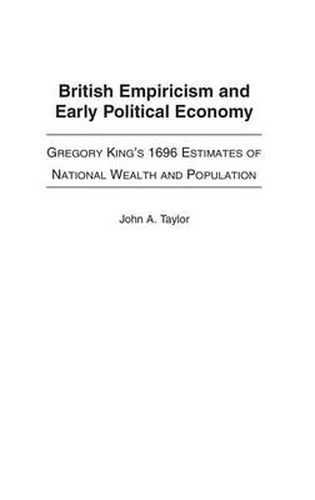Readings Newsletter
Become a Readings Member to make your shopping experience even easier.
Sign in or sign up for free!
You’re not far away from qualifying for FREE standard shipping within Australia
You’ve qualified for FREE standard shipping within Australia
The cart is loading…






Gregory King (1648-1712) was an engraver, herald, surveyor, and Secretary to the Commissioners for the Public Accounts, but he is best known for his 1696 estimates of the wealth and population of England. Writing in 1696, but calculating for the year 1688, he put the population at approximately 5.5 million. Historians have recently doubted the accuracy of these estimates. In this book, John A. Taylor argues that King was an honest compiler of statistics, and that his eccentric calculations based on the available 1696 data were motivated by the problems he faced. Because he used only empiricism and shop arithmetic, the 1696 estimates were probably as accurate as anyone in the 17th century could have made them.
Gregory King (1648-1712) was an engraver, herald, surveyor, and Secretary to the Commissioners for the Public Accounts, but he is best known for his 1696 estimates of the wealth and population of England. Writing in 1696, but calculating for the year 1688, he put the population at approximately 5.5 million. Historians have recently doubted the accuracy of these estimates. In this book, John A. Taylor argues that King was an honest compiler of data whose eccentric calculations of the 1696 data available to him were motivated by the problems he faced. Because he used only empiricism and shop arithmetic, the 1696 estimates were probably as accurate as anyone in the 17th century could have made them.
This first book-length study of King’s work positions his successes and shortcomings as a statistician within the context of the whole ongoing failure of statisticians to construct a method of exact prediction about human society. In addition to this valuable commentary, Taylor also includes reprints of several scarce but very important documents by or about King, including King’s 1696 estimates of national population and wealth, his autobiography, his essay on the naval trade of England, his letter on Queen Anne’s Bounty, and the life of King written by George Chalmers.
$9.00 standard shipping within Australia
FREE standard shipping within Australia for orders over $100.00
Express & International shipping calculated at checkout
Gregory King (1648-1712) was an engraver, herald, surveyor, and Secretary to the Commissioners for the Public Accounts, but he is best known for his 1696 estimates of the wealth and population of England. Writing in 1696, but calculating for the year 1688, he put the population at approximately 5.5 million. Historians have recently doubted the accuracy of these estimates. In this book, John A. Taylor argues that King was an honest compiler of statistics, and that his eccentric calculations based on the available 1696 data were motivated by the problems he faced. Because he used only empiricism and shop arithmetic, the 1696 estimates were probably as accurate as anyone in the 17th century could have made them.
Gregory King (1648-1712) was an engraver, herald, surveyor, and Secretary to the Commissioners for the Public Accounts, but he is best known for his 1696 estimates of the wealth and population of England. Writing in 1696, but calculating for the year 1688, he put the population at approximately 5.5 million. Historians have recently doubted the accuracy of these estimates. In this book, John A. Taylor argues that King was an honest compiler of data whose eccentric calculations of the 1696 data available to him were motivated by the problems he faced. Because he used only empiricism and shop arithmetic, the 1696 estimates were probably as accurate as anyone in the 17th century could have made them.
This first book-length study of King’s work positions his successes and shortcomings as a statistician within the context of the whole ongoing failure of statisticians to construct a method of exact prediction about human society. In addition to this valuable commentary, Taylor also includes reprints of several scarce but very important documents by or about King, including King’s 1696 estimates of national population and wealth, his autobiography, his essay on the naval trade of England, his letter on Queen Anne’s Bounty, and the life of King written by George Chalmers.